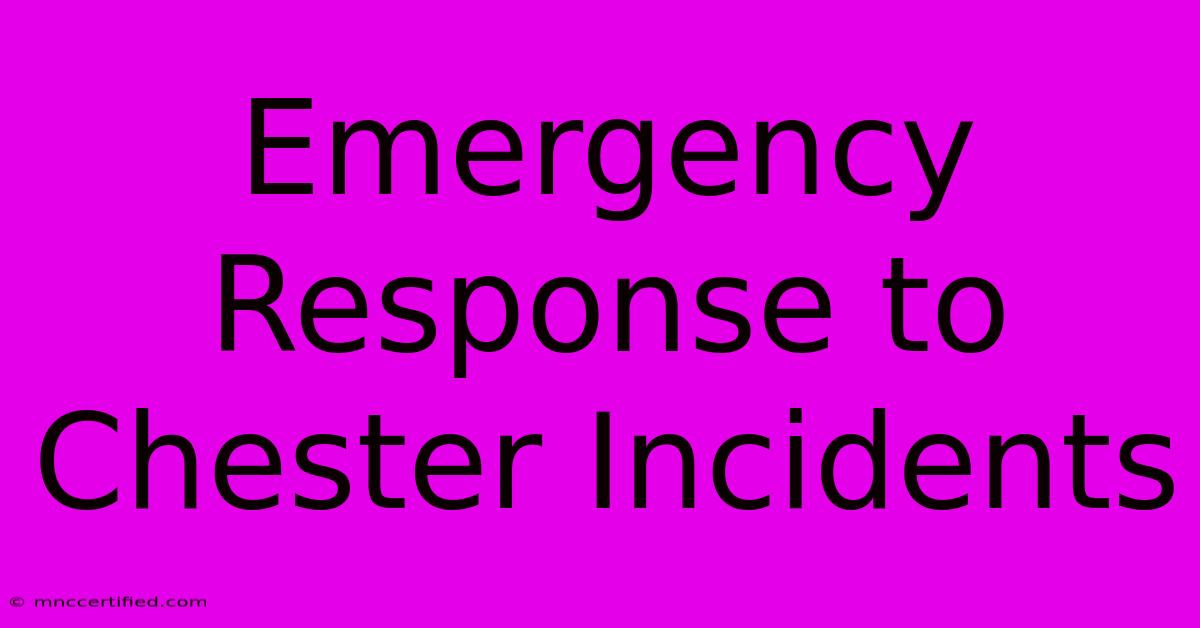Emergency Response To Chester Incidents

Table of Contents
Emergency Response to Chester Incidents: A Comprehensive Guide
Chester, like any other city, faces various emergencies. Understanding the emergency response system and knowing how to react are crucial for resident safety and community well-being. This guide provides a comprehensive overview of Chester's emergency response procedures, covering everything from reporting incidents to understanding the roles of different agencies.
Understanding Chester's Emergency Services
Chester's emergency response relies on a coordinated network of agencies working together to ensure swift and effective action. Key players include:
- Cheshire Constabulary: Responsible for policing and maintaining order. Dial 999 (or 112) in case of an emergency requiring police intervention. Non-emergency situations can be reported online or by phone.
- Cheshire Fire and Rescue Service: Handles fire-related incidents, including rescues and hazardous material spills. Contact them via 999 (or 112) for immediate assistance.
- North West Ambulance Service (NWAS): Provides ambulance services and responds to medical emergencies. Call 999 (or 112) immediately if someone requires urgent medical attention.
These services work in close collaboration with other agencies such as local councils and support groups during large-scale incidents or natural disasters.
Reporting an Emergency in Chester
Knowing what to do in an emergency is paramount. Always remember to:
- Stay calm: Panic can hinder effective communication.
- Assess the situation: Identify the nature of the emergency and any immediate dangers.
- Call 999 (or 112): This is the emergency number for police, fire, and ambulance services. Be prepared to provide clear and concise information:
- Your location (as precisely as possible).
- The nature of the emergency.
- The number of people involved.
- Any other relevant information.
- Follow instructions: Listen carefully to the emergency operator and follow their instructions.
Non-Emergency Reporting
For non-emergency situations, contact the relevant agency directly. This includes reporting crimes that don't require immediate police intervention, making non-urgent inquiries to the fire service, or contacting your local council for issues like damaged streetlights or potholes.
Different Types of Incidents and How to Respond
Chester, like any urban area, can experience various emergencies. Here's a breakdown of common incident types and recommended responses:
1. Medical Emergencies:
- Heart attack, stroke, severe bleeding: Call 999 immediately.
- Minor injuries: Seek treatment at a local medical facility or contact your GP.
2. Fires:
- House fire, building fire: Evacuate the building immediately and call 999.
- Small fire (e.g., cooking fire): Attempt to extinguish the fire safely using appropriate methods. If unsuccessful, evacuate and call 999.
3. Crime:
- In progress crime (robbery, assault): Call 999 immediately. If safe to do so, observe details like the perpetrator's description and vehicle information.
- Non-emergency crime reporting: Report online or by phone to Cheshire Constabulary.
4. Road Traffic Accidents (RTAs):
- Serious RTA: Call 999 immediately.
- Minor RTA: If safe to do so, move vehicles to a safe location and exchange details with the other party involved. Report to the police if required.
Preparing for Emergencies in Chester
Proactive preparation can significantly improve your response to emergencies. Consider:
- Creating a household emergency plan: This plan should detail evacuation routes, meeting points, and contact information for family members.
- Building a first-aid kit: Stock your home with essential medical supplies.
- Familiarizing yourself with local emergency services: Know the contact information and procedures for local agencies.
- Staying informed: Keep up-to-date with local news and weather alerts.
Conclusion
Effective emergency response in Chester relies on a collaborative effort between individuals, agencies, and the community. By understanding the emergency services, reporting procedures, and taking proactive steps to prepare, you can contribute to a safer and more resilient community. Remember, swift and accurate reporting is key to ensuring a timely and effective response to any incident. Being informed and prepared significantly increases your chances of staying safe during emergencies in Chester.

Thank you for visiting our website wich cover about Emergency Response To Chester Incidents. We hope the information provided has been useful to you. Feel free to contact us if you have any questions or need further assistance. See you next time and dont miss to bookmark.
Featured Posts
-
Worlds Tallest And Shortest Meet
Nov 23, 2024
-
Is Gold Bond Lotion Gluten Free
Nov 23, 2024
-
Bonding Insurance For Nonprofit
Nov 23, 2024
-
8000 Argentine Pesos To Dollars
Nov 23, 2024
-
Xiao Long Vs Quang Le Ufc Macau Results
Nov 23, 2024